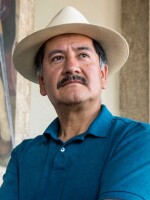(SOUNDBITE OF VICENTE FERNANDEZ SONG, "EL HIJO DEL PUEBLO")
RACHEL MARTIN, HOST:
We're going to spend a few minutes now remembering one of Mexico's biggest names in popular music. Singer Vicente Fernandez died yesterday. He was the country's top ranchera singer.
NPR music contributor Betto Arcos is on the line. Betto, thanks for being with us.
BETTO ARCOS, BYLINE: Thank you for inviting me.
MARTIN: So it's hard to overstate the influence of Vicente Fernandez. He was just a massive superstar in Mexico. Tell us about him.
ARCOS: In the history of Mexican popular music, Vicente Fernandez was one of a kind. He was adored by millions, not just in Mexico, all over the Spanish-speaking world. In fact, a few years ago, I was interviewing a flamenco singer from Spain, and she told me he was one of her heroes. And yesterday, radios around Latin America played his songs all day. He has millions of fans all over and also here in the U.S., where he toured regularly.
MARTIN: Right.
ARCOS: Country singer George Strait said this on his Twitter - sad news today, we lost the amazing legendary Vicente Fernandez this morning, one of my heroes. Here's one of his early hits, "La Misma," "The Same."
(SOUNDBITE OF SONG, "LA MISMA")
VICENTE FERNANDEZ: (Singing in Spanish).
ARCOS: The lyrics say, "Mariachis, play the same song, the one that touches me deep in the heart. The abandoned, play it again. Play the same song 10 times."
MARTIN: Can you tell us more about his particular style of singing?
ARCOS: The essence of Vicente Fernandez are these seemingly contradictory Mexican characters, a strong male who fights till the end and a deeply sad man devastated when the woman he loves abandons him.
(SOUNDBITE OF SONG, "PALABRA DE REY")
FERNANDEZ: (Singing in Spanish).
ARCOS: In the song called "Palabra De Rey," or "Word Of The King," he sings, "If you don't want to stay, if you already learned to forget, you can leave if you want. Just don't tell me where you're going."
MARTIN: What a voice, too. Fernandez grew up in this working-class family - right? - in the state of Jalisco. How did he become such a popular music figure? What was the arc of his career?
ARCOS: Well, he was a singer people identified with. He was one of them from the small town of Huentitan on the outskirts of Jalisco's capital, Guadalajara, the epicenter of mariachi music. See, Guadalajara is also the city that gave Mexico an international identity with three emblematic elements - tequila; the charro, or the spangled outfit with the big, round hat; and mariachi music.
And Fernandez represents all of these key elements of Mexican identity. When he was a kid, his mother would take him to the movies to see the larger-than-life figures of Pedro Infante and Jorge Negrete, and he always wanted to be like them. He started singing as a teen. And in the mid-'60s, he moved to Mexico City and got his first record contract with CBS Records.
MARTIN: Wow. Was there a specific song that really helped launch his career?
(SOUNDBITE OF SONG, "VOLVER VOLVER")
FERNANDEZ: (Singing in Spanish).
ARCOS: Yes. In 1976, he recorded "Volver Volver," and his career took off. The song became one of the most popular anthems of Mexican music. It's a song about lost love. It's been recorded by countless Mexican singers since then, but his version remains the classic.
MARTIN: NPR contributor Betto Arcos. Thank you so much. We appreciate it.
ARCOS: My pleasure. Transcript provided by NPR, Copyright NPR.




